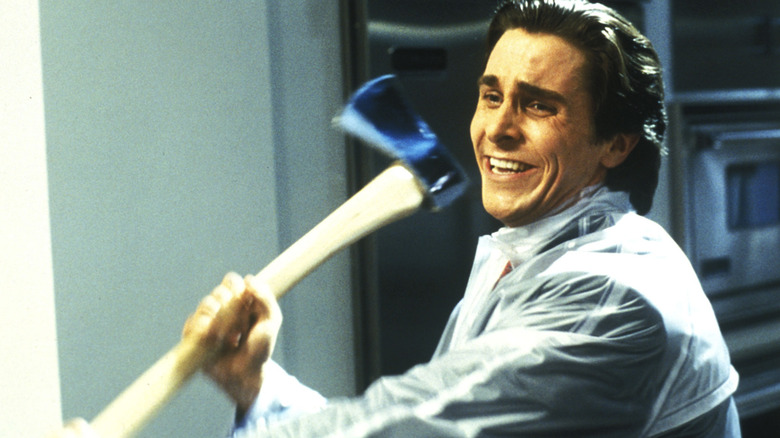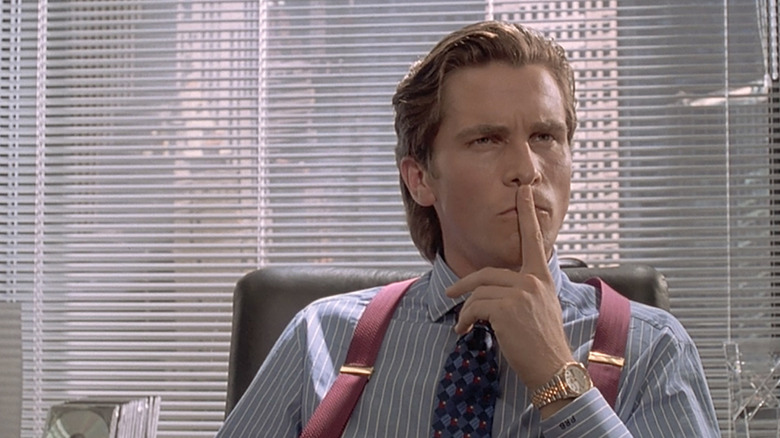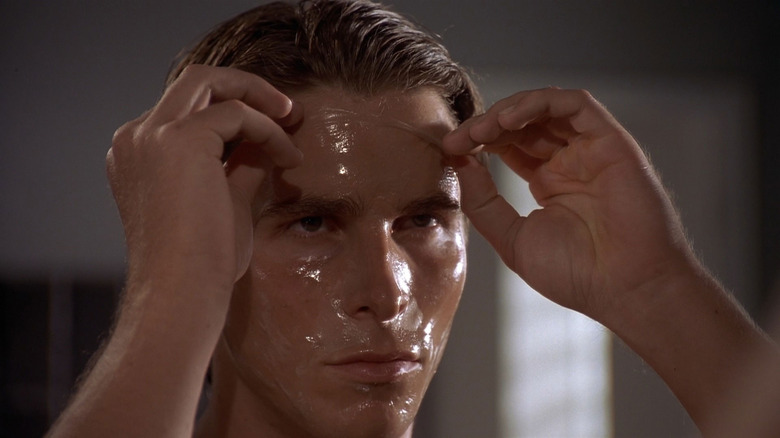Christian Bale's American Psycho Co-Stars Thought He Sucked At Acting
We may receive a commission on purchases made from links.
Bret Easton Ellis' novel "American Psycho" was published in 1991, serving as the final nail in the coffin for the once-flourishing toxic yuppie culture of Reagan's 1980s. The protagonist of the book, Patrick Bateman, was a soulless stock-handling wonk and occasional serial killer whose intense obsessions with wealth, status, and the empty popular culture of the '80s continually drove him to depravity and murder. Ellis based Bateman on many of the Wall Street bros he regularly encountered while living in New York throughout the previous decade. When director Mary Harron and he co-screenwriter Guinevere Turner adapted "American Psycho" to film in 2000, they presented Bateman's soulless yuppie lifestyle as a natural outcropping of shallow maleness. Bateman became just as vapid and whiny as he was monstrous and threatening. Harron and Turner saw Bateman not as an aberration with a psychological problem to be unlocked, but the logical endpoint of male vanity and aggression.
When actor Christian Bale first read the script, according to an oral history presented by MovieMaker, he laughed throughout. He also wasn't sure of that was the appropriate response. When he told Harron his reaction, she told him it was the right one, and that they should talk in person. While the production was in flux for a while — Oliver Stone was attached at one point, as was Leonardo DiCaprio as the star — Harron and Bale would eventually make the film they wanted.
Harron and Bale created just the right Patrick Bateman. It wasn't until later that Bale learned that his co-stars thought he was doing a bad job.
'Why did Mary fight for this guy?'
Bale fully devoted himself to the role, doing all the necessary working out and skincare routines that Patrick Bateman described in detail. Harron did not want a sympathetic character, and Bale was willing to be horrible. Unfortunately, his horribleness was seen as an acting weakness by co-stars. Bale said:
"Josh Lucas and I did a film together recently and he opened my eyes to something that I had been unaware of. He informed me that all of the other actors thought that I was the worst actor they'd ever seen. He was telling me they kept looking at me and talking about me, saying, 'Why did Mary fight for this guy? He's terrible.' And it wasn't until he saw the film that he changed his mind. And I was in the dark completely about that critique."
Bale has said that he does not subscribe to the Stanislavski method of acting (although his "American Psycho" co-star Chloë Sevigny saw him that way), and he has admitted that he can take his devotion to certain roles a little too far. Sevigny said of working with Bale:
"Working with Christian was pretty hard because I didn't know this whole Method thing. I was pretty fresh. I hadn't done that many films before, and that an actor would lose himself to such a degree and was so consumed by the part, I was having a hard time kind of ... just wanting to socialize with him, but feeling that he didn't, and then my ego being like, 'Does he not like me? Does he think I'm a terrible actress?'
Luckily, after filming wrapped, and Sevigny started going to film festivals with Bale, he proved to be a kind, approachable person:
"I remember as a wrap gift I gave him a 45 of 'Psycho Killer' by Talking Heads, which I thought was the greatest wrap gift, in the world, ever. But then when we went to festivals and stuff after, like Berlin and whatnot, he was very friendly then. When we were not shooting, doing press and stuff, he couldn't have been a nicer guy."
Patrick Bateman for president
The Oliver Stone version of Patrick Bateman was, according to the oral history, going to be a multiple-personality story, giving Bateman — then the DiCaprio version — far too much sympathy. To repeat: Harron wanted an unsympathetic a character as possible. Bale was willing to play a monstrous man, not something all actors are necessarily willing to do. As the actor explained, he and Harron were copasetic on Bateman's lack of psychological background:
"I think the thing that united us on it is I had no interest in his background, childhood — and she didn't either. We looked at him as an alien who landed in the unabashedly capitalist New York of the '80s, and looked around and said, 'How do I perform like a successful male in this world?' And that was our beginning point. And we didn't want to talk about why was he this way, what happened in his childhood — there was none of that between Mary and I."
"American Psycho" recently passed its 20th anniversary — it was released on April 14th of 2000 — and it's easy to look back at the film and see Donald Trump. Trump is name-checked in "American Psycho," and he was held up as an aspirational figure for horrid yuppies throughout the '80s. Trump's brazenly pro-ignorance, me-only philosophy was a central part of the ultra-male outcropping mentioned above. Bale certainly saw Tom Cruise in Bateman, but also Trump:
"I mean, look, if someone had landed at that time and he was looking around for cultural alpha males, business-world alpha males, et cetera, than Tom Cruise certainly would have been one of those that he would have looked at and aspired to be and attempted to emulate. And he's still a leading man now. So yeah, I had pictures of him inside the trailer, as I did other people, and '80s models that Bateman probably would have looked at and tried to imitate. And certainly that megawatt smile with the perfect teeth.
"Likewise, Donald Trump would have been somebody he would have looked at and said, 'Ah, right. I need to have a little bit of that as well.' ... If Bateman were around today he'd probably be inspired to run for president.
A chilling thought indeed.


